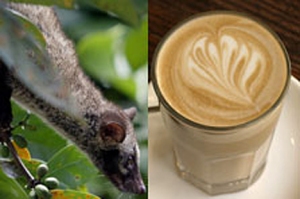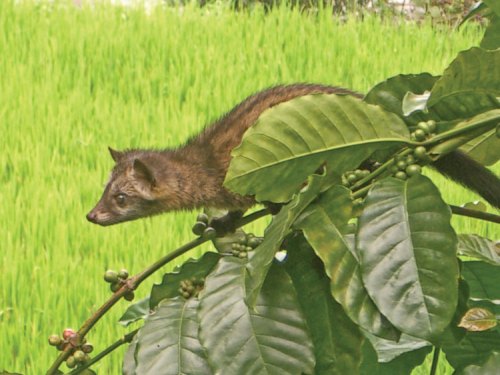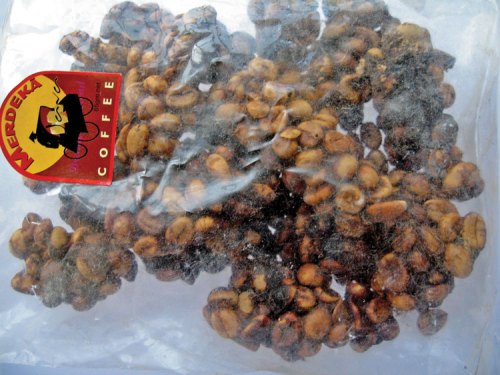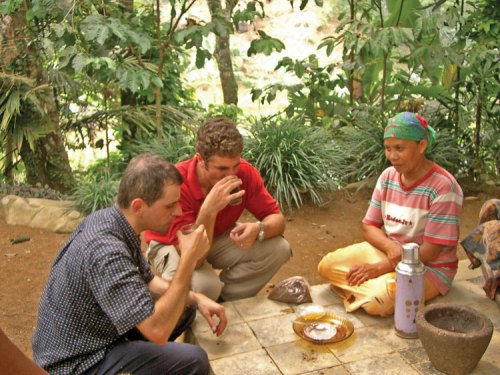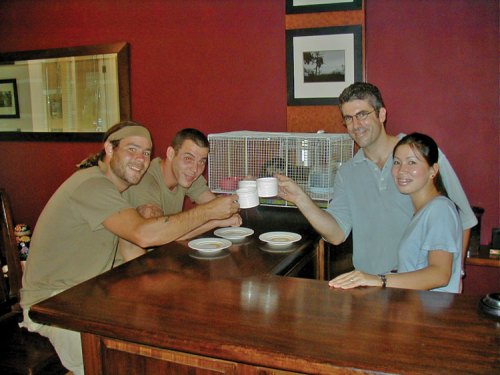
Perfect Kopi Luwak beans

The shy civet selecting his dinner
As seen in the New York Times! Read the article here (opens a new window).
The rare and exotic Kopi Luwak (often translated as civet coffee) is renowned all around the world for its incredibly delicious, subtle, lingering flavor and exceptional smoothness.
Kopi Luwak, or Civet Coffee, is "processed" by the Indonesian Civet, who populates the coffee-growing areas and comes out nightly to feast on only the ripest of the coffee cherries. The beans do not digest and are collected daily by farmers, who thoroughly sanitize the beans, and then dry them in the sun. Then the beans are roasted and vacuum packed for shipping.
Genuine Kopi Luwak coffee beans release hidden flavor compounds from the beans that are never accessed by regular roasting and brewing. These wonderful, locked-away flavors are released because of the natural enzymes of the civet.
Although the coffee is expensive per pound, a cup of home-brewed civet coffee actually costs less than an average cup of brewed coffee bought at a café like Starbucks. Our direct personal relationship with the producers allow us to offer one of the world's greatest culinary treasures at an exceptional value! We are the only website in the world, that we can verify, selling multiple bean species of Kopi Luwak from several different producers.
As with all our products, we stand behind our Kopi Luwak and absolutely guarantee its quality and authenticity. We have been dealing in Southeast Asian coffee for years and we take great pride in our spotless reputation. Our Kopi Luwak is guaranteed 100% genuine and delicious civet coffee. We ship all civet coffee with suggested brewing instructions and information about the source.
Brewing Civet Coffee: Kopi Luwak can be prepared in any regular coffee machine, or in a Vietnamese-style Phin filter, which brews a single cup of intense coffee at a time (more about Phins here). We include guidelines on using your home coffeemaker to brew delicious Kopi Luwak, as well as a free Phin filter with instructions, so you can try that method, too. In essence, civet coffee can be brewed like an ordinary coffee - but the result is extraordinary!
Philippines Kopi Luwak
(Coffee Alamid by Bote Central)
Exclusive USA distributor! Bote Central recently appeared in the New York Times. Read the article here (opens a new window).
We brought some of this wonderful coffee home from a trip to the Philippines, and we immediately fell in love with the fragrant Classic Blend of Arabica, Excelsa and Liberica kopi luwak beans. Bote Central's Coffee Alamid is one of the most respected civet coffees in the world. It is harvested weekly from twenty independent gatherers who roam the high-alititude forests. The coffee is packed in a vacuum-sealed 100 gram (3.5 oz) bottle that makes an excellent gift.
With every order, we include an attractive scroll explaining the heritage of the coffee and providing brewing tips. Also, although the coffee is delicious brewed in a regular coffee machine, we also include a free Vietnamese-style Phin filter for an ultimate gourmet experience.

Sumatran Kopi Luwak
On our Sumatran civet farm, located in the Lampung province, civets dine on a fine strain of Arabica Typica, producing a bright and light-bodied brew, absolutely free of any bitterness, with a truly incredible and persistent aftertaste. We have never experienced a coffee with such a delightful aftertaste, drifting back into your awareness like a pleasant daydream and taking you once again to coffee nirvana.

Civet lapping coconut milk
from a saucer during
his daily playtime
Philippine and Sumatran Kopi Luwak Combo
Try two favorite civet coffees and save $20 off the list price!
Comparing two fabulous coffees is one of life's great pleasures: Tasting one against another helps you to notice flavors and aromas particular to each bean or blend.

Organic Bantai Civet Coffee
- Shade-Grown Robusta
This environmentally and ethically sound coffee comes from the Julia Campbell Agro-Forest Memorial Park in the Philippines. The park shelters the rare Philippines civet and is also home to the native people who live in communion with the civets and their forest. The Robusta trees grow in shade at an unusually high altitude, a unique growing method for Robusta that produces extremely smooth and luxurious coffee with hints of almond, spice and fruit.
Each bag of Bantai Civet Coffee comes with a free gift bag, as pictured, and a laminated information sheet describing the coffee and its origins.

New Kopi Luwak - Liberica Gold!
(Coffee Alamid by Bote Central)
Exclusive USA distributor! Bote Central recently appeared in the New York Times. Read the article here (opens a new window).
Liberica is a vanishing species of coffee that is only now being brought back from the brink of extinction. Its almond-shaped beans have an exceptional aroma, almost floral and fruity, while its flavor is full and slightly earthy. Kopi Luwak Liberica is a great way to enjoy Liberica because the civet brings out even more of the rich, full body of the Liberica. Comes with a scroll telling the story of the coffee and the company that produced it.
100% Liberica Coffee
Curious about Liberica? While supplies last, you can now order authentic 100% Liberica coffee (non-Kopi Luwak)! Its almond-shaped beans have an exceptional aroma, almost floral and fruity, while its flavor is full and slightly earthy. Have a taste of history, an exotic cup of an endangered coffee that we guarantee you have never tasted anything like before. Liberica is a vanishing species of coffee that is only now being brought back from the brink of extinction. 500 grams = 1.17 lb.

Liberica Blend Coffee
Curious about Liberica? While supplies last, you can now order authentic Liberica coffee (non-Kopi Luwak) blended with premium, high-altitude Philippines Excelsa. Liberica’s almond-shaped beans have an exceptional aroma, almost floral and fruity, while its flavor is full and slightly earthy. Liberica is a vanishing species of coffee that is only now being brought back from the brink of extinction. The Excelsa used in this blend is the perfect complement - it creates a balanced cup with an accessible, rich and earthy profile. 500 grams = 1.17 lb. 250 grams = 8.8 oz.

